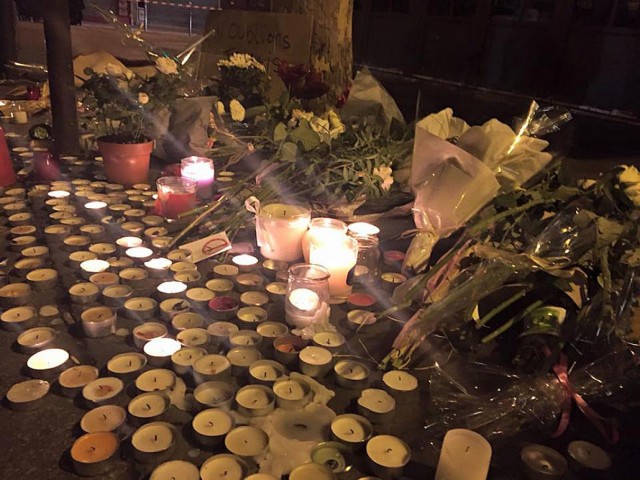Leaders in The United Methodist Church and other denominations, while expressing their shock over the Nov. 13 terrorist attacks in Paris and solidarity with the French people, nevertheless caution against condemning all Muslims or calling for a dangerous escalation of military action in response. They also urge Americans to not reject, out of fear, the U.S. decision to accept desperate Syrian refugees fleeing war and devastation in their home country.
Many religious leaders, including at the World Council of Churches, also expressed dismay for equally disturbing attacks that have occurred elsewhere, including the Nov. 12 bombings in a Beirut, Lebanon, shopping area that claimed 41 lives.
Terrorists attacked innocent people twice last week, reports Joe Iovino of UM Communications (UMCom). “On Nov. 12, 43 people lost their lives and another 200 were wounded by suicide bombers in Beirut. Soon after the group calling itself the Islamic State (ISIS) claimed responsibility. The next day in Paris, at least 129 people were killed and hundreds more wounded in coordinated terrorist attacks by ISIS.”
Bishop Warner Brown, President of the United Methodist Council of Bishops, issued a statement on the Paris attacks, calling for prayer for the people of France and “communities around our world that will not make the news, but cringe under the threat of violence.
“These events have impacted them in the way September 11, 2001, grieved the U.S.,” he wrote. “We weep for the senseless violence. We weep for the innocents whose lives were cut short. “We weep for those who are grieving, who are frightened, who are hurting…. As several world leaders have stated, this is an attack on all humanity.”
Yet, he added, “We know that God is with us, that he sustains us with hope and that he will dry our tears. Once again, the forces of evil have tried to dominate; but, as disciples of Jesus, we must make our witness that the darkness will not overcome our light.”
In “Shock, solidarity after Paris attacks” the UM News Service’s (UMNS) Linda Bloom reports on sentiments expressed by Bishop Patrick Streiff, episcopal leader of Central and Southern Europe, which includes a small number of United Methodist congregations in France, and the Rev. Susan Henry-Crowe, who heads the United Methodist Board of Church and Society. Both pointed to Jesus Christ, “the Prince of Peace,” as the model of love, courage and hope we must follow “as peacemakers” responding to terrorist attacks.
German Bishop Rosemarie Wenner, meeting with her German Central Conference executive committee when the killings occurred, told UMNS, “Although we were blessed by the many positive reports of how United Methodist congregations welcome strangers, we are also worried because of an increase of hostility and Islamophobia which might even become bigger after the terrorist attacks.”
Many United Methodists have met and come to know refugees from Syria, Iraq and elsewhere through their relief work, said Thomas Kemper, chief executive of the United Methodist Board of Global Ministries. He pointed out that the Beirut bombings invoked the same horror and anguish as Paris.
“The events of Paris may encourage border restrictions in the name of security and prohibit the entrance of Syrian and Iraqi refugees who have endured terrorism for years,” he warned in a Nov. 16 statement titled Grief, Dismay and Prayers for Peace in Wake of Paris Attacks. “We pray that governments and people may resist anti-refugee sentiment and continue to offer sanctuary to those in need.
“We must not allow terrorists to deter democratic nations and religious and secular peacemakers from reaching out to the refugee children, youth, men and women,” Kemper continued. “We must join together in finding comprehensive ways to reverse the political and military violence that is the cause of increasing refugee numbers. Violence is not the end of the story, God’s redeeming love and grace is.”
Editor’s Note: In Responding to Violence UMCom offers some resources for helping people, and especially children, cope with news of violent events, along with news about how the church is responding with peace in a world of violence, and stories about how individuals and ministries can make a positive difference in the most difficult of times.
Information compiled from articles and statements by John Coleman, Eastern PA Conference Communications Director

